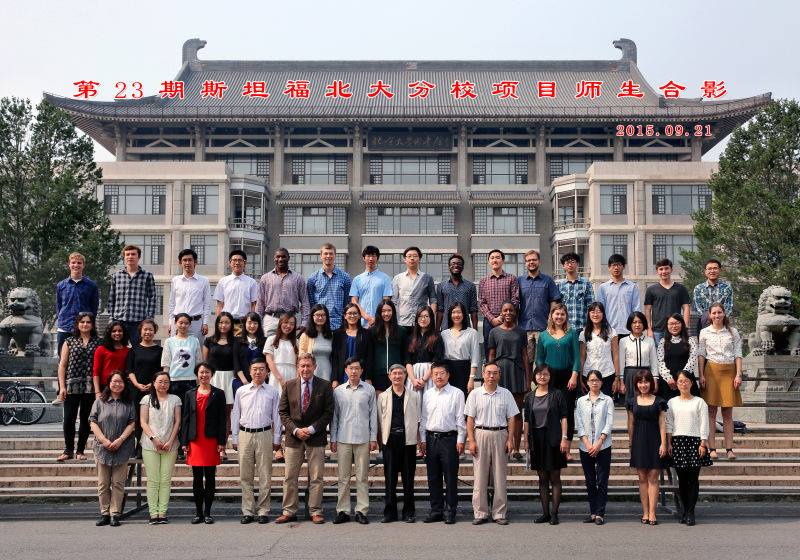Stanford has announced that due to low enrollment, it will be indefinitely suspending its undergraduate overseas studies program in Beijing at the end of the 2016-2017 academic year.
This decision comes just months after the University’s consolidation of both the Chinese and Japanese majors and minors into one East Asian Studies program; both changes were made due to low interest and enrollment.
The Beijing program, which allows undergraduate students to study at Peking University, one of China’s leading research institutes, was established in 2004. Enrollment, which was high at first and able to fill the 20 to 30 slots each year, steadily declined over time. Last spring, only eight students participated in the program.
Ramón Saldívar, director of the Bing Overseas Studies Program (BOSP), attempted to make the program more accessible by eliminating the Mandarin language prerequisite, but that did not improve enrollment.
“In our various pilot programs around the world, when we reduced the language requirement or removed it altogether, enrollments shot up,” Saldívar said. “In the case of the Beijing program, though, it didn’t have any effect.”
Priyanka Sekhar ’17, who studied in Beijing during the fall quarter of 2015, was one of the students who signed up due to the absence of the language prerequisite. While there, however, she noticed that some aspects of the program differed from what she had expected.
“When we got there, it was a little disorganized,” Sekhar explained. “I felt like it was a little chaotic on the part of the administrators. A lot of the events we did weren’t with Stanford — we would kind of plan our own things.”
Sekhar believes that her experience contrasts with those of students who may have studied abroad in one of the eight other countries that BOSP currently offers programs in. To her, the Beijing classes and facilities seemed subpar compared to what she heard of student experiences in other countries.
But the main issue for Sekhar stems from the lack of program focus on Stanford students’ fields of interests.
“A lot of computer science majors and engineers tend to be more interested in going to Germany because there’s an internship attached to it, and you can take engineering courses there that count toward your major,” she said. “Then people who aren’t [of those majors] are generally most interested in Europe because it’s more ‘fun,’ and people who are interested in global service tend to go to South Africa.”
Saldívar echoes this sentiment that students believe there are fewer reasons to study abroad in Beijing compared to other locations.
“I don’t think it was any one factor that caused low interest,” he said. “I think it was a cluster of factors. One issue is that there aren’t many students studying China or East Asia as part of their major. They may be interested in it for the cultural magnificence that it is, but there has to be some other reason for them to go to draw them there, such as being part of their major or minor requirements, and clearly that isn’t happening in Beijing.”
To Sekhar, a shift in the program’s focus may be the answer to increasing interest in traveling to China.
“Right now, its target is cultural, so it’s only going to attract people who are culturally interested, and that’s basically just people from the one East Asian Studies major,” she said. “If they attached [the program] to some type of work experience or if it was more targeted toward something like a business focus, it might attract more people from MS&E or [Economics].”
However few right now, there are still students who were considering studying in Beijing, to whom the cancellation comes as a disappointment.
“I’m taking Chinese because I feel that it’s an important, interesting language to learn and its acquisition will lead to many opportunities,” Paolo Vera ’20 said. “Living in Beijing would have helped speed up the process of learning Mandarin, which was what made the study abroad program very appealing.”
There is some hope, however, for students like Vera: Stanford is looking to move the program to a different location in China, ideally beginning in the 2018-19 academic year.
“Different places always have different draws, and I suspect that part of our motivation [to move the program] is just to get a different perspective on China,” Saldívar explained. “Beijing offers the capital, political center of Chinese life, but Shanghai, for example, is also a major Chinese city [that] has a different history and a different kind of cultural milieu. The very fact that it’s a new place for us, I think, will also be of interest to some students.”
The exact details of the program, though, will likely not be solidified for a while.
“We’re not committing to opening a permanent center in any place; we want to do at least several runs of pilot programs to try out what levels of interest there are in places,” Saldívar said. “But in my opinion, China is too important a region, too important a player in global affairs for us to ignore it.”
Contact Lisa Wang at lisaw20 ‘at’ stanford.edu.
